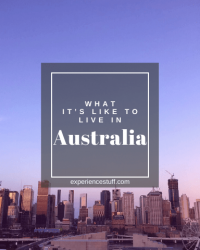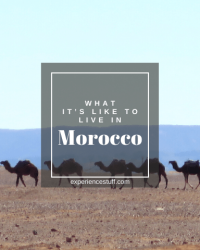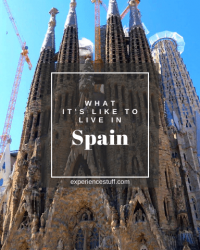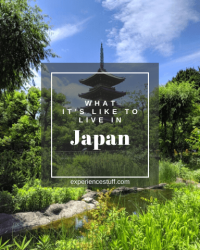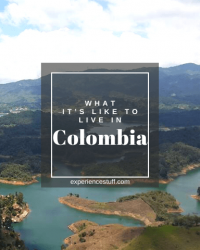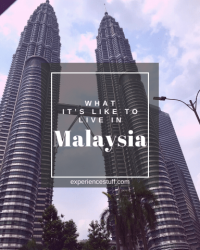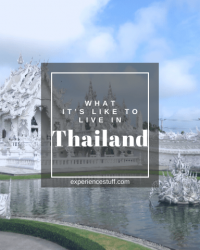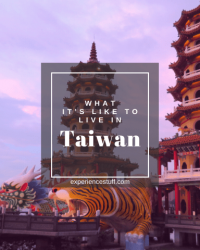Discover the truth about Plovdiv, Bulgaria: Inside Tips from a Livability Expert
This post will show you what living in Plovdiv, Bulgaria is like.
It covers:
- Housing
- Food
- People
- Budget
- Things to do
- and more!
Let’s check out Plovdiv!

Bulgaria is thought of as the “wild east” among Europeans. I only found this out after being there for a month. I got the idea to check out the area from a blog, and didn’t know much about the country aside from a chapter on World War II in high school (I didn’t know how to even say hello when I arrived).
At the time, I was suffering from a classic case of overconfidence after a few successful forays in “dangerous countries”. As a result, I didn’t feel the need to do my homework.
On paper, Bulgaria satisfied a lot of requirements for me as a slow traveler: lightning fast internet, good infrastructure, and affordable living costs. Other things about the country like its deep history, distinct culture and warm people (yes, they’re actually friendly to outsiders) were nice surprises.
Upon boarding the plane in Frankfurt, Germany to Sofia I noticed a few things. The plane was a bit older than the one I took to get to Germany and the pilot flew it like we were landing in enemy territory.
People were noticeably different too. A bit less refined, but enjoying the experience of flying more. I arrived in Sofia and got picked up by my Airbnb host in a Volvo from the 80s I’m surprised still ran. They drove me two hours to my home for the next three months, Plovdiv and we somehow communicated without speaking the same language.
Once I arrived in an extremely local neighborhood, I knew I was in over my head. The streets looked like something you’d see in a Hollywood movie when they show Soviet Russia. The grass was wild and unkempt, buildings were older, gray and a bit rundown.
Most of all, I stood out like a sore thumb with a fluorescent band aid on.
I realized a couple things that day:
- I’m still a novice when it comes to the world
- They don’t get many tourists where I was staying
- I needed to learn Cyrillic yesterday

Bulgaria is a case of smaller country with big neighbors. They were at war with the Byzantine Empire for 675 years, subjugated by the Ottoman Empire for 500 years, and finally part of the Soviet Bloc until fairly recently.
They maintained their unique culture and heritage despite all this.
The land itself is extremely fertile and offers unexpected benefits like some of the best produce I’ve had in the world.
Read on to find out more about this unique place.
***Disclaimer***
This post is based on my experiences as an off-white westerner who has been living abroad since 2006. How you’re treated depends on who you are, how you behave and which street you’re on. Experiences may vary.
Brief History

Bulgaria lies a region that was inhabited by the Thracians from 6th century BC until the Romans conquered it (Spartacus was Thracian).
Bulgars, who were semi-nomadic, originate from north of the Black Sea (they were a member of the confederation of tribes led by Attila the Hun). They were actually driven south by the Khazars, another nomadic people from deeper in the steppes.
Bulgarians believed in Tengrisim, a mostly monotheistic religion that many steppes tribes followed. They worshipped the sky god Tengri, until their conversion to Orthodox Christianity in 865.
Khan Kubrat, who united the three Bulgar tribes, conquered vast territory (stretching from Hungary to Greece) and divided it among his sons in the 600s.
The Cyrillic alphabet originates in this early Bulgarian Empire in the 9th century.
After that, things kind of went downhill for a while with 675 years of war with the Byzantine Empire (they were conquered a few times, most notably by Basil II who divided 15,000 prisoners into groups of 100 men, blinded 99 men in each group and left one man in each with one eye to lead the others home. It’s rumored that the Bulgarian Emperor died of a heart attack from the sight of it.).
Then, the Ottoman Empire subjugated the country for over 500 years (Bulgarians were sometimes forced to give up sons who were converted to Islam and trained to be an elite fighting force called Janissaries, who at times rose to high positions in the empire).
Tsarist Russia helped Bulgaria gain independence from the Ottomans (Catherine the Great actually started the idea of Russia protecting the Orthodox population), but allied with Serbia after to make sure they didn’t gain too much power.
After World War II, Bulgaria became part of the Soviet Bloc after the Soviet Union backed the 1944 Bulgarian coup d’état.
Bulgaria became a center of IT and technology for decades under that system.
Living conditions in Bulgaria

- Weather is pretty nice in Bulgaria. The summers and winters are relatively mild, unless you’re in a high altitude region like Bansko.
- Internet is a dream come true. It’s unbelievably fast, cheap and reliable. It’s no coincidence that Bulgaria is the customer service center of Europe.
- Transportation within cities is not that great. The bus system that links cities is though and you can get anywhere in the country quickly on a budget. There were call taxis at the time, but you might want to learn some phrases in the language before calling. Be careful hailing a cab off the street because the off-brand ones will rip you off.
- Safety wasn’t much of an issue for me. A French couple I met in the old town remarked that it was safer than Paris. Avoiding the ghettos probably made things a bit better.
- Water is safe to drink out of the tap, but might have a strange taste. I mostly drank bottled water just to be sure.
- Sanitation is pretty good. There are large communal dumpsters in every neighborhood that get picked up often. Air quality is not great in Sofia. It’s a lot better in other places.
- Groceries are not diverse, but their flavors are amazing. In Plovdiv, the produce was mostly grown locally and doesn’t look like what you’d see in a western grocery store. They’re not photogenic, but taste amazing. This is where I first discovered that ugly produce usually equals delicious. I didn’t look for online shopping, since I don’t think it existed at the time.
Bulgaria fluctuates a lot in terms of living conditions. I stayed in three neighborhoods, Kichuk Parish (Little Paris, which was once considered a nice area), Central (average) and Karshiaka (expat and upper class). There was a lot of variety in living conditions and neighbors, but overall it felt somewhat consistent in terms of safety and appearance.
I even witnessed the opening of the first modern mall in the city center and went during the first weekend. It was bittersweet since on the one hand they were developing, but also they were losing some tradition and becoming more materialistic.
Watching a movie is an interesting experience. The previews are local commercials and public service announcements that lasted almost 30 minutes. People seem to tolerate this stuff a lot more.
I didn’t have too many problems with safety while I was there.

There were some local guys (Bulgarian men tend to be massive) at the first gym who were a bit territorial and felt the need to assert dominance. But things were fine once I started saying hello in Bulgarian and going at a different time.
The second gym I went to was the main bodybuilder gym in the region. Think Gold’s Gym in Venice Beach when Arnold used to work out there in the 80s. I was easily one of the smallest people there (women included). I would get discouraged when men would treat my heavy set of 95 pound curls as a warm up.
After you get used to the surroundings, it’s really nice to live in Bulgaria.
Karshiaka had an organic vegan café with out of this world food. The local gym also had more of a yuppie vibe and I was average-sized once again.
You can find some amazing experiences like watching a traditional Bulgarian performance at a Roman Ampitheatre. This was in the center of town for centuries until it was rediscovered in the 70s after a landslide.
Coffee quality is high on average and every place has a full bar. Smoking is common on outside terraces. A local girl once asked me with amazement, “you don’t smoke?”.
There were some really nice, quiet places where I got to know the owners and staff. They were curious about why I was there and were super friendly. One even gave me jar of homemade Lutenitsa, which was one of the best gifts I’ve received.
Nightlife can be fun and people enjoy themselves.
There’s some deep river valleys, mountainside monastery/fortresses and plateaus that are breathtaking. You can even check out the Black Sea in Varna and party with Russians and Brits. The landscape has many interesting rock formations that are worth a look too.
Housing

Housing in Bulgaria teaches you not to judge a book by its cover.
Buildings often look run down, but many are refurbished inside using modern materials and design. I moved neighborhoods three times because I wanted get a more complete picture of what it’s like to live in the city.
I did spend a month in a Khrushchyovka type place that was decorated Babushikta (grandmother) style. Despite the exterior and backyard looking like a setting in a Resident Evil video game, it was actually very warm and didn’t have an insect or zombie problem.
The housing prices ranged from $400 to $1,000 a month.
Food

Plovdiv is situated near the Thracian plain, which has been an agricultural center since the Roman period. (it’s said that the valley fed the Roman army)
The produce that comes from that region is flavorful beyond belief. You can simply buy tomatoes and eat them like an apple. I was lucky enough to get my hands on a jar of homemade Lutenitsa (vegetable chutney made with roasted tomatoes, onions, bell peppers, carrots, etc.) It did not last 24 hours and I dream about it to this day. It’s still the best thing ever done with vegetables.
I stuffed myself for the first month with 1 euro kebabs as big as my head (I made the mistake of asking them if it was Turkish food, not a wise choice), 1 liter bottles of aryan (salty yogurt drink) and 5 dollar pizzas the width of a big rig hubcap. That and the gym environment helped me put on 5 kilos of fat/muscle.
I also went to the top rated restaurants in town and had feasts for 30 dollars. This included a full course of ribeyes, brie wheel, foie gras and a bottle of wine.
Yogurt in Bulgaria has ruined me. I can’t help but compare everything else to how creamy and lively it was.

Wine is on another level. They have one of the oldest wine cultures in the world. They use classic methods with no shortcuts, and the grape varieties are amazing. I went tasting at a local winery, which is still the best wine I’ve had for the price.

Rakia is a type of grape brandy and it kept me drunk at least 20% of the time. I would go through the same process every Saturday. Buy a bottle and have a glass. Suddenly, without realization, the bottle would be half empty and I would be hammered. I’d wake up in the afternoon the next day, look in the fridge and say, “oooh Rakia!” and repeat until Monday. I had to stop buying Rakia, because it was so hard to stop drinking once I started.
I even tried sushi, which was nice if you like Salmon and cream cheese (pretty much every menu item had it).
Their take on Mexican was pretty good given the high quality of ingredients. After a few months I tried their Burger King, which was on point too and probably the best one I’ve been to. Even the sandwich I bought at the airport in Sofia was huge and would be considered gourmet in my home country.
There’s still a Turkish community in Plovdiv. I tried authentic dishes for the first time, which were criminally underpriced and amazing. You can also get some Turkish Tea, Baklava and Lokum at a Mosque built in the 1300s.
Needless to say, Bulgaria made me realize how price and reputation don’t equal better when it comes to food and wine.
People

People are unlike any I had met previously. There’s no idle chit chat or smiling at strangers on the street, but there’s a warmth that is genuine.
If someone doesn’t like you, they won’t even look in your direction. Once you get used to it, it’s refreshing, especially for introverts.
A foreign writer who became popular in Bulgaria in the 1800s wrote an account of how a hundred burly men on horseback rode full speed in his direction when he arrived outside of town. He was completely terrified, but it turned out they were in a race to see who could greet him first. This custom is out of fashion now, but gives you an idea of what to expect.
My first memorable experience happened a day after I arrived in the old town. I went inside a café to ask if I could seat myself outside. The lady working there shook her head in a figure eight motion, made a shooing gesture with her hand and a “tsss tsss” sound. I assumed this was the local way of telling me to “piss off”. But upon further investigation, the head gesture meant yes and the hand gesture meant “be my guest”.
Nodding one’s head means “no” and “shaking” it means yes in Bulgaria. I had quite a few misunderstandings as you can imagine.
One thing I advise against is getting into a shouting match with a local. I was doing great until the last month when I thought a taxi driver was taking the long way. His response was to make the loudest sound I’ve ever heard out of a human being.
You will be jostled a bit if you’re in someone’s way but it’s nothing personal. I’ve seen them do it to everyone and it’s not really considered rude. It made me feel a bit like I was back in Korea.
As you can imagine, there’s a huge difference between the older and younger generations. The older generation speak Russian or German as second languages, while younger people speak fluent English. There’s even a small hipster community that makes craft beer.
Cost of living

Cost of living in Bulgaria is very affordable.
Housing varied by neighborhood, but you can have a very high standard of living on 1,500 USD a month. I was able to eat at the best restaurants in town with this budget.
Budget
$800 USD to $1,500 USD a month depending on your housing quality and where you live.
Unique experiences

Sights
Red-orange rooftops and green hills in Plovdiv old town.
Gray apartment blocks and soviet style sculptures around the cities.
Ottoman style mosques with red-orange bricks.
Unique rock formations in the countryside.
Sounds
Chalga music and cars honking
Smells
Roses, grapes, roast meat and cigarette smoke.
Things to do
Watch a movie in a 4,000 BC Thracian fortress at Nebet Tepe
Take a tour of a monastery in the countryside
Check out beautiful cathedrals in Sofia
Have tea or coffee at a café with a view of a roman stadium, Ottoman Mosque and Soviet Shopping center in Plovdiv.
Check out Orthodox religious art
Go wine/Rakia tasting and forget your name
Get lost in the “trap” (Kapana) in Plovdiv and find some cool cafes and shops
Watch a performance at the Philippopolis Roman Theatre in Plovdiv.
Play find the Soviet monument in a city
Rating
Difficulty: ★★★★★★★★☆☆ (8/10)
Not for beginners. You’ll be fine if you stick to the touristy areas, but you need to have your guard up at times.
Live: ★★★★★★★★☆☆ (8/10)
Life is pretty good in Bulgaria for expats. I still consider it one of my favorite places to live.
Visit: ★★★★★★★★☆☆ (8/10)
There’s enough history, delicious food and unique experiences to keep you busy for weeks.
Did we miss anything?
Bulgaria is a great place to live or visit.
Let us know your Bulgaria tips below!

